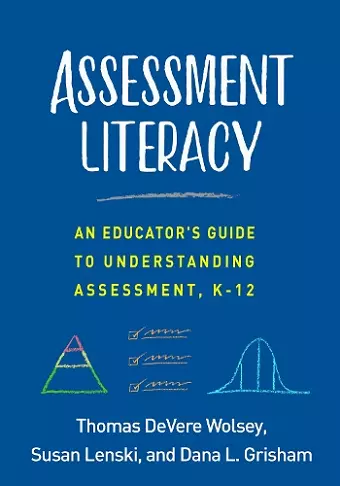Assessment Literacy
An Educator's Guide to Understanding Assessment, K-12
Dana L Grisham author Susan Lenski author Thomas DeVere Wolsey author
Format:Hardback
Publisher:Guilford Publications
Published:19th Feb '20
Currently unavailable, and unfortunately no date known when it will be back
This hardback is available in another edition too:
- Paperback£27.99(9781462542079)

This clear, no-nonsense book guides current and future teachers through the concepts, tools, methods, and goals of classroom literacy assessment. The expert authors examine the roles of formative, summative, and benchmark assessments; demystify state and national tests and standards; and show how assessment can seamlessly inform instruction. Strategies for evaluating, choosing, and interpreting assessments are discussed, as are ways to communicate data to parents and administrators. User-friendly resources include boxed vignettes from teachers and researchers, practical assessment tips (and traps to avoid), and 12 reproducible planning forms and handouts. Purchasers get access to a Web page where they can download and print the reproducible materials in a convenient 8 1/2" x 11" size.
"Assessment Literacy is more than just a guide--it’s a mindset change. The book reframes assessment as 'story' and helped me find a more comfortable stepping-in point for using assessments as a tool for (and with) instruction. Classroom teachers who want assessments to mean more than just scores on summative tests will benefit from the myriad options shared. From organizers to rubrics, the authors offer examples across multiple disciplines as well as tools that can be modified for different purposes, with tips on how to avoid the tricks and traps along the way."--Melissa Provost, MSEd, English/language arts teacher, Portsmouth Middle School, New Hampshire
"Beginning with the idea that the Latin root of assessment means 'to sit,' Wolsey, Lenski, and Grisham pull up a chair and provide readers a more humane, productive vision of teaching, learning, and, yes, assessment. Peppered with stories and strategies from other educators, Assessment Literacy pivots the conversation away from judgment about what students cannot do. Instead, it demonstrates a holistic approach informed by what students can do. This book leads us toward more sustainable, substantive assessment practices that are applicable to all literacy classrooms."--Troy Hicks, PhD, Department of Teacher Education and Professional Development, Central Michigan University
"Assessment Literacy is that rare professional book that both enlightens and entertains. While comprehensive, it is accessible to a wide variety of preservice and inservice teachers and administrators. The book is truly a pleasure to read (when was the last time you heard that word linked to assessment?). The authors demystify assessment and empower teachers to utilize it as a meaningful tool for learning, rather than a dreaded task to endure. In an era when assessment and evaluation are sometimes used as a cudgel against, or a carrot for, teachers, this book offers a wise, compassionate view of the story that students, parents, and teachers can co-create through masterful assessment.”--Judith Dunkerly-Bean, PhD, Elementary Education Program Director, Department of Teaching and Learning, Old Dominion University
“This book is important for all teachers, whether new teachers or veterans. It is written in conversational language and provides ideas that can be implemented in the classroom without a lot of effort. The rubrics and guides are simple to use and can be adapted to any classroom at any level (including adult education). As teachers, we need to realize how urgently our students need feedback to stay engaged, to learn, and to develop the desire to learn more. However, our feedback must be positive, relevant, and formative.”--Paula Dreyfuss, MSEd, teacher, Vista Unified School District, California
“An easy-to-read guide to what teachers need to know about the literacy assessment process, the book is filled with examples of dialogue and models of assessment that speak directly to the preservice or practicing teacher. It builds the teacher’s knowledge about the importance of assessment used in the service of student learning. Numerous examples demonstrate how to implement meaningful formative literacy assessments that deepen learning for elementary and secondary students.”--Linda Smetana, EdD, Department of Educational Psychology, California State University, East Bay-
ISBN: 9781462542086
Dimensions: unknown
Weight: 574g
194 pages